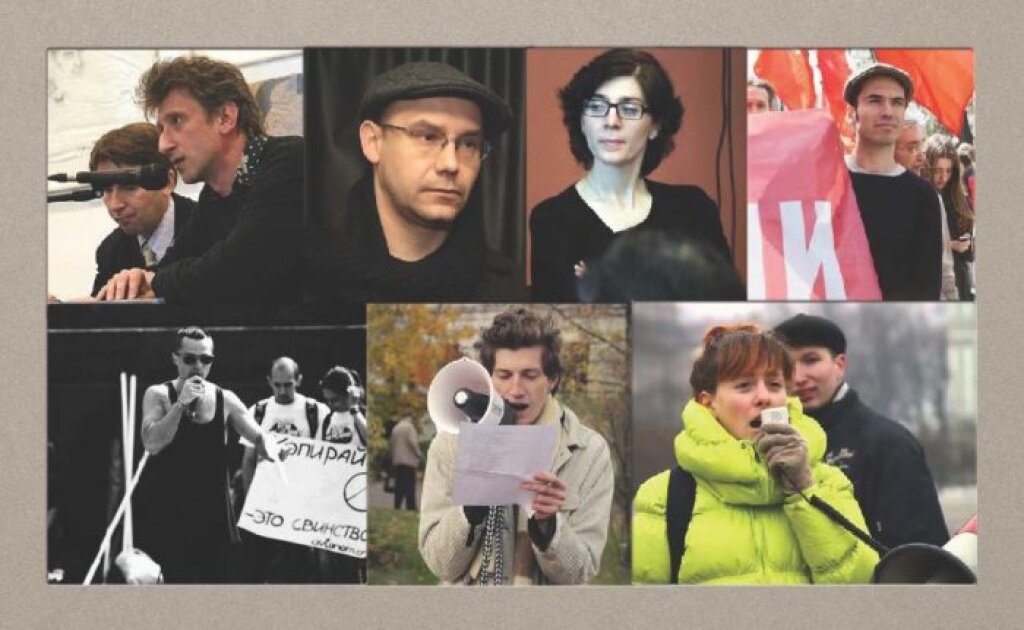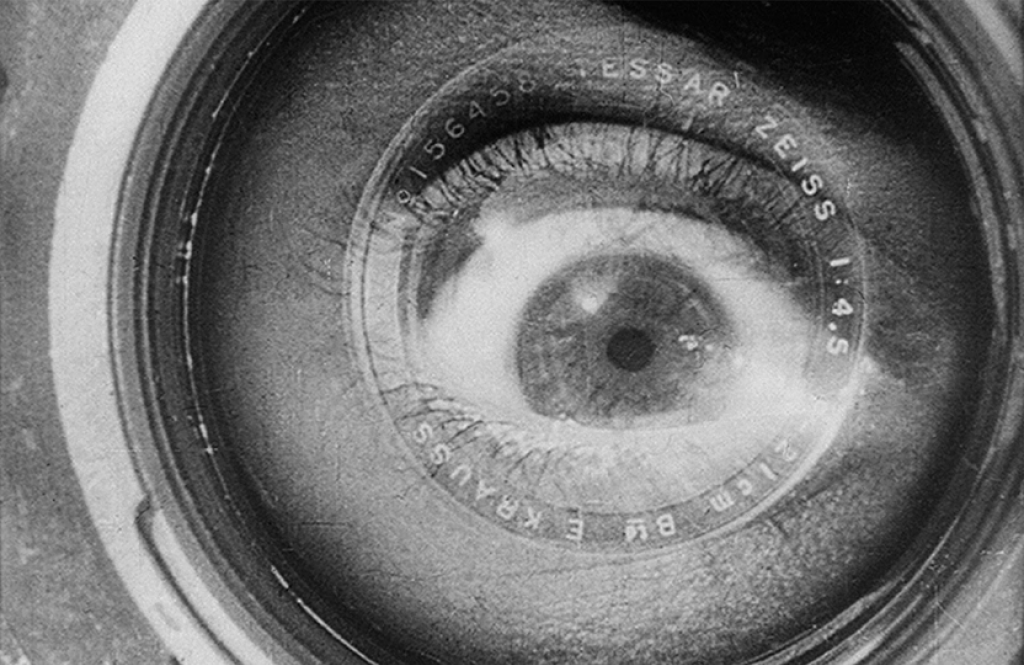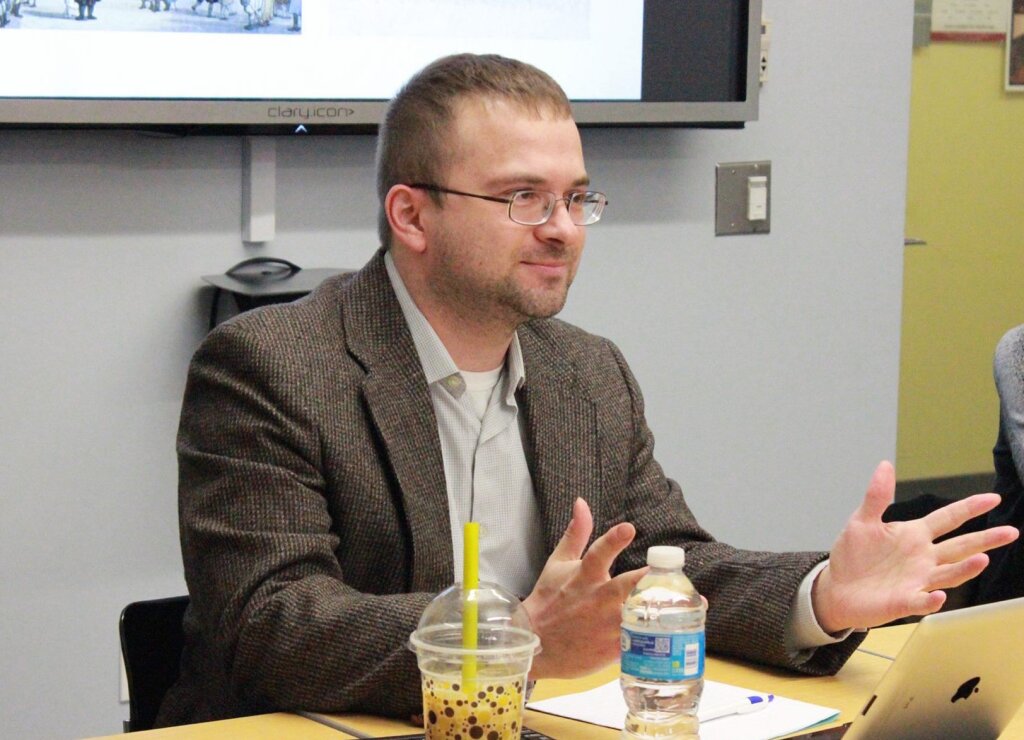On Friday, October 12th, the Jordan Center hosted Assistant Professor of Slavic Languages and Literatures Marijeta Bozovic for a talk on her in-progress work “On Avant-Garde Post: Radical Poetics After the Soviet Union”. Professor Bozovic has written ехtensively on 20th and 21st century Russian and Eastern European cultures, and her current research focuses on 21st century Russian avant-garde activist poets. The talk, part of the Occasional Series, was introduced by Assistant Professor of Russian at New York University Rossen Djagalov.
Professor Bozovic prefaced the introduction of her research by posing the question of what politically engaged art across the former Soviet Union can add to the understanding of socialism in the present day. Fifteen years ago, according to Bozovic, Western scholars would have answered the question by evoking Soviet dissidents and their “vivid tales of the treachery of leftist utopianism”. But a select group of today’s Russian dissidents are engaged in a reevaluation of the theory’s misrepresentation in the Soviet Union. As a result of the rapid privatization of property following the fall of the Soviet Union, Russia has been in a dire need of Marxist class-based analysis, argued Bozovic. Despite statistics demonstrating exceptionally low social mobility rates and very high poverty rates, the topic of socioeconomic class has become taboo in Russian social sciences and political rhetoric.
But there is a notable exception: the urgency of addressing the severe economic gap has been gaining traction among several artists and poets. The first outburst of such ideas took place during the 2011 Bolotnaya Protests, in the works of contemporary avant-garde artists and poets such as Pavel Arsenyev, Kirill Medvedev and Galina Rymbo, all of whom aim to reexamine socialism in a post-socialist institutional space. Bozovic’s research explores this cohort of contemporary avant-garde poets, and the paradoxical use of prefixes in her title gestures at temporal paradoxes revived in their work. She basically argues that these contemporary Russian poets “seek in the legacies of the historical Russian avant-garde of 1910s and 1920s an undetonated alternative to both the neoliberal global present, and to the still relatively recent discredited institutionalized left.”
The result is a fusion of the literary traditions of the 20th century Russian avant-garde with international Marxist-informed critical theories. A new performative component to this poetry, the poetry’s digital dissemination via blogs such as “Translit”, and an influx of newly-translated politically engaged theory and philosophy into Russian, posits this new Russian avant-garde as a distinct combination between the post-Soviet and the transnational. This movement reaches beyond the goal of surviving current and recent trauma by presenting a politically gauged artistic direction for the 21st century. The new avant-gardists depart from narratives of transition and recovery, venturing into the space of renewed experimentation and “dreams of futurity”. This blend of a socialist past with global egalitarian ideas challenges both the discourses of the Russian authorities and the major opposition .
One of the focal points of Professor Bozovic’s research is how these poetic works are digitally disseminated. According to Bozovic, this form of circulation marks the reemergence of the avant-garde journal, and represents an archival element to their methods. But while the poets rely heavily on the digital realm to circulate their works, there is also an important physical, performative element to their work, that differentiates them from the avant-garde poets of the early 20th century. Bozovic brought to light poet Pavel Arsenyev’s piece “Mayakovsky for Sale”, a work that requires the reader to use a computer scroller: a synthesis of media, performance, and tech. Arsenyev also pioneered a slogan that propelled the 2011 Bolotnaya protests, “Vy nas dazhe ne Predstavlyaet”, which translates to both “you don’t even represent us”, and “you can’t even imagine us”. The double entendre is a conceptual pun that uses language for pragmatic ends.
Professor Bozovic continued her talk by recalling an exhibit that NYU Global Distinguished Professor Boris Groys hosted a few years ago for the E-Flux gallery that focused on contemporary Russian artists and their responses to their homeland’s communist past. Bozovic recalled Keti Chukhrov’s play “Love Machines” that attempted to deal with the emergence of a political subjectivity, and while containing Marxist undertones, never ventured into the realm of nostalgia, holding accountable the Soviet Union for the failures of institutional socialism. The production of the play also opened with a reference to the poem “DyDyr Bul Shchyl” by the early 20th century Russian avant-garde poet Aleksei Kruchenykh, a reference that Bozovic referred to as “a mocking rebuke of avant garde teleology”.
One of the common threads uniting these contemporary avant-garde artists was the influence they took from the poet Dmitry Prigov. According to Bozovic, Prigov spearheaded the fourth turn of the Russian avant-garde, setting the foundation for this new contemporary, “paradoxically post-Soviet” movement. “He brought poetry into the space of conceptual art and of performativity,” Bozovic said, adding that he was “a performance artist playing great Russian poets”. Prigov was known for his critique of the logocentrism associated with the poet figure in the Russian tradition; one of his most famous works was a performance in which he read the Olga’s letter from “Evgeny Onegin” as a Buddhist mantra, in effect renouncing the work’s aesthetic autonomy and devaluing the prophetic role of poet. In association with the contemporary poets, Bozovic points to the fact that you can’t simply read this sort of work by Prigov as verse; in doing so it would ultimately lose its point, and simply reading a poem by Pavel Arsenyev would have the same effect.
Professor Bozovic concluded her talk by explaining how researching this new contemporary strand can have positive effects on a building a cooperative transnational relationship on the backdrop of a domineering Cold War discourse. The different international schools of Marxism, such as the Frankfurt School, that are so prevalent in Western academia, have been the ideological basis for these poets. Their works are now becoming accessible in English: Keith Gessen’s translation of Kirill Medvedev’s work gained wide recognition in Western publications, including the New York Times. With the tradition of mixing political and aesthetic radicalism fading in the U.S. — these works can serve as a wind of fresh inspiration.



